|
|
|
|
|
|
|
|
|
|
|
|
|
|
|
|
Putting on the Brakes
The legislature has burned through 12 of its 40 legislative days, and has passed very little legislation. The problem is the budget, but it’s more than that — it’s a constitutional crisis of the balance of powers between Georgia’s legislative and executive branches.
At the core has been the refusal of Governor Kemp to provide the legislature with the information it needs to evaluate the impact of budget cuts he has ordered to the 2020 budget, which was passed by the legislature and signed by the Governor last year. When Speaker Ralston tried to schedule emergency hearings last fall, the Governor instructed department heads to not attend and provide no information to the legislature.
So the Governor put the brakes on the legislature last fall. The idea that all the work of the legislature must be completed within the 40 day session, and not during the remaining 9 months, threatens to reduce the role of the legislature to a rubber stamp of the executive branch.
So far, the legislature is not having it.
Speaking of Brakes, “Have you driven on I-285 lately?”
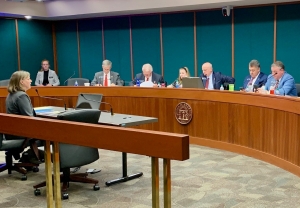
Telling the Senate Transportation Committee that SD 40 residents did not want “Spaghetti Junction on steroids.”
Last week I shared with you that I filed SR 654, which proposes a constitutional amendment permitting the Georgia Department of Transportation (GDOT) to use gas tax revenue for public transit. I filed this legislation because of the multi-billion dollar managed toll-lane project being planned by GDOT for the top end of I-285. Basically, we’re getting a toll road expansion, which no one seems to want, instead of rails and buses, because GDOT is limited by Georgia’s constitution to spending its $2 billion on nothing but roads and bridges. Our constitution is holding us back.
To my surprise and at the very last minute, I got word that SR 654 was scheduled for a hearing in the Senate Transportation Committee. My team scrambled to put together handouts, spread the word, and call experts to testify. Fortunately, the planets aligned, as it was lobby day at the Capitol for pedestrians and cyclists, who happen to be big transit fans. Several were able to attend the Committee Hearing.
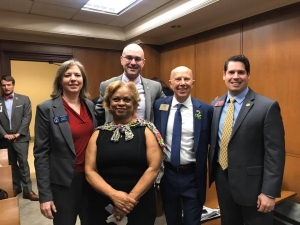
I was happy to see PEDS, a group that advocates for pedestrian-safe society, who were supportive of SR 654 which would provide more funding for public transit.
I’m extremely grateful to Mayor Lynn Deutsch of Dunwoody and Neill Herring of the Sierra Club for coming to testify, and to several Senate 40 constituents who came down to support the bill. Committee members are always on better “behavior” when they know a member’s constituents are in attendance. Together, we were able to pull together an excellent presentation that grabbed the attention of several news outlets.
Passing this constitutional amendment is a heavy lift, but the hearing opened up a productive dialogue with the Senate Transportation Committee about the need for dedicated funding for public transit. Chairman Beach, a fellow Atlanta suburban colleague, pledged to work with me on alternative solutions to public transit funding and I intend to hold him to it.
If you’d Iike to see public transit instead of toll roads, call or email Senator Beach and thank him for holding a hearing on SR 654 and ask him to keep his commitment to find more funding for public transit.
Georgia Kids Can’t Catch a “Break”
Last week, I announced my intent to file my “After School Recess Act,” a bill that bans graded homework for students in grades K-2. I’d like this bill to be bipartisan, if at all possible, so I pitched the bill to several of my Senate Republican colleagues. The response so far has been favorable and I got a commitment from the Chairman of the Senate Education Committee for a hearing and vote. This week, I’ll be following up with colleagues that said they’d consider co-sponsoring the bill before I file.
You may recall that the Governor vetoed a bill we passed last year guaranteeing recess for our youngest students, an issue I’ve worked on for decades. If kids don’t get recess during school, we should give parents the ultimate “local control” allowing them full choice in how to spend precious family time.
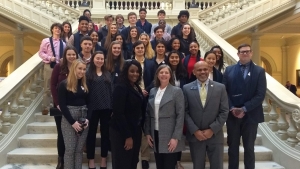
It was a pleasure to speak with this group of Dunwoody High School students on Advanced Placement Day at the capitol, sponsored by the College Board
In-State College Admissions: Higher Education was also high on last week’s agenda as I met with lobbyists from Georgia Tech and the University of Georgia about their opposition to SB 282, a bill that would require Georgia’s designated research universities to allocate at least 90 percent of its early admissions to Georgia residents. Those of us with college-aged kids know how hard it has become for Georgia students to get accepted to our own state-funded schools. Students paying out-of-state tuition bring significant money to our universities. Ninety percent may be a tough benchmark to set, but I appreciate the intent to keep our best and brightest in state.
Ironically, I learned in the Urban Affairs Committee that Georgia’s historically black colleges and universities (HBCUs) have the opposite problem attracting out-of-state students due to the higher tuition rates. Senator Lester Jackson presented a bill to allow Georgia’s HBCUs the ability to offer up to 10 percent of its out of state students waivers to receive in-state tuition. Current law only allows for two percent of out-of-state students to receive in-state tuition.
Annexation, Coal Ash, and Ensuring the Dam Doesn’t Break
Annexation: With 10 cities and three counties in my district, this is an issue I work on quite often. When a parcel of land is annexed into a city, there are many implications to work through, with tax revenues and schools at the top of the list. Last week, I met with Peachtree Corners’ City Manager to discuss border issues with the City of Norcross. And our Dekalb Delegation meeting focused on a bill that we passed last year that separated the annexation of land from the annexation of schools, to prevent an unfortunate situation between the City of Atlanta and Dekalb Schools from happening again. But Governor Kemp vetoed that bill so we are back to the drawing board.
Coal Ash: The Natural Resources Committee unanimously approved SB 123, a bill that would raise the surcharge for dumping coal ash in Georgia from $1/ton to $2.50/ton, putting it on par with other types of dumping surcharges. Coal ash is a growing problem in Georgia. Georgia’s low surcharge brought coal ash from other states posing health risks to communities near the dumping grounds. A higher surcharge will help curb that problem.
That Dam Bill: I enjoy being on the Natural Resources Committee because I learn about things I might not otherwise. Last week, we had a bit of fun with that dam bill, SB 319, about building downstream from Georgia dams. Once a structure is built downstream from a dam, the dam becomes a Level 1 dam which brings a significant amount of state oversight and cost due to the safety concerns for the downstream structures. SB 319 aims to save the state and builders money by requiring structures built downstream to build to a higher standard to survive possible water flow and keep the dam at a Level 2 instead of changing it to a Level 1.
Bill Nigut’s Political Rewind: Did you catch me on Political Rewind discussing my Peachcare Public Option proposal to allow all Georgians to buy in to the state’s popular Peachcare program? If not, you can watch it here.
It’s Not Really a Break
Some committees will still meet during this week’s recess and we will be looking closely at the budget this week alongside Appropriations meetings of both the House & Senate.
We will not publish a Snapshot next week, and will return to our regular schedule the week after.
A Comedy of Errors, But The Show Goes On
The Republican leadership has been slow to release bills to the Senate floor, which allowed me time to focus on the work my district sent me to do. I filed two bills:
SB 339, A Medicaid Public Option: Modeled after Georgia’s successful Peachcare for Kids program — available to ANYONE, no matter your age, income level or insured status. Don’t like your private plan? You have another option!
SR 654, Funding for Public Transit: Proposes a constitutional amendment to allow the Georgia Department of Transportation to use gas tax revenue for public transit.
Unfortunately a stomach bug and a clerical error threw me a couple of curveballs this week. Thanks to a team effort, we were able to overcome them and keep things moving.
Was it Dual Enrollment or a Stomach Bug?
This week, the Georgia Senate passed HB444, which outlines program cuts to Georgia’s highly successful and popular Dual Enrollment program. The program allows motivated high school students to “Move on When Ready,” and take college and technical school classes free of charge, earning credits that count both for college and high school, and was a focus of our previous Lieutenant Governor, Casey Cagle.
Governor Kemp wasted no time last year targeting Dual Enrollment for cuts. The legislature is now fast tracking a bill through that only lets students “Move On” with half as many credits as before.
With college tuition crippling students with debt, Dual Enrollment has been a lifeline for Georgia families, including my own. It’s not an exaggeration to say I am heartsick about these cuts. But the morning the bill came to the Senate floor, I literally woke up sick. I was proud to remotely watch my Senate Democratic Caucus colleagues take up the mantle to defend Dual Enrollment and speak against the bill. Sadly, the bill passed along party lines, and will be going back to the House so that they can either agree or disagree to the changes made by the Senate. Call and email your house Representative and let them know where you stand on these cuts.
Medicaid Public Option and a Clerical Error
On Wednesday, I addressed my Senate colleagues after filing my signature piece of legislation for the year — a Medicaid Public Option that would allow ALL Georgians, regardless of age, income, or insurance status, to purchase Medicaid, at the same cost it takes the government to deliver the services.
I’ve heard from a number of constituents who have private plans with such high monthly premiums and deductibles that they have a hard time finding money to pay the doctor. They feel they have to forgo healthcare even though they have insurance. And they often can’t trust their health insurance because they get billed for services they thought were covered.
With a public option, the government sets the price instead of a for-profit company. This keeps prices down, increasing competition in the market to keep costs down for everyone, including those with private plans. The plan is modeled after the popular Peachcare for Kids, and would simply be another option on the marketplace that consumers could choose. Close to 20 other states are taking a serious look at how to make a public option work for them. It’s time Georgia does the same.
The concept of a Medicaid Public Option is new, so this was not an easy bill to draft. We went through multiple versions — so many in fact, that I inadvertently filed the wrong one! And I learned this week that some mistakes made in the Senate can be fixed!
The Secretary of the Senate gave me a little cheat card with the formal language you must use on the Senate floor to make a motion to withdraw a bill. In the process, I got to see the inner workings of the Secretary of the Senate’s office, including the script that they prepare for the Lt. Governor that guides him as he presides over each day’s session.
A Course Correction, A Bipartisan Success, and Other Matters
Transportation: This week I filed a Constitutional Amendment to allow Georgia’s gas tax to be used for transit. Georgia’s Constitution currently only allows our gas tax to be used for roads and bridges. This is why we’re seeing managed toll roads instead of transit options to solve our traffic woes. Our Constitution is holding us back and we must change course. It won’t be easy — a Constitutional amendment requires two-thirds of the vote in each chamber and a ballot referendum. But it is time for that fight.
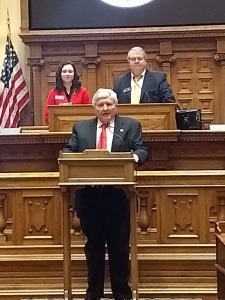
Elected with bi-partisan support, GDOT Board Member Rudy Bowen addresses the 7th Congressional District Delegation, with Chair Sen. Steve Henson and Secretary Rep. Beth Moore.
Speaking of transportation, it’s not often that Republicans and Democrats can all agree on something, so it was nice to participate in a rare example this week as the Gwinnett County Delegation voted unanimously to re-appoint Rudy Bowen, a long-time public servant, to represent the 7th Congressional District on the Georgia Department of Transportation Board.
Gangs: This week, the House and Senate Public Safety Committees held a joint meeting to learn more about gangs, a major focus of the Governor. Young kids are being recruited into gangs as early as elementary school age, so we must focus on ensuring Georgia’s most vulnerable kids see a better path through education and positive programming.We can’t arrest our way out of this problem, and we must tread thoughtfully and carefully. Georgia already has some of the toughest laws on the books. We must make sure that Governor Kemp’s efforts on gangs don’t undo the great progress former Governor Deal made during his term on criminal justice reform.
We’ll be monitoring this issue closely.
What’s on Deck?
We only have five more days officially scheduled for this session, which will bring us to day 14. House Speaker Ralston held off on releasing the remainder of the calendar until he saw the Governor’s budget proposal. It’s anybody’s guess what happens from here!
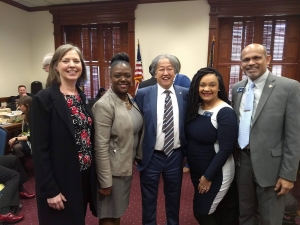
It was a pleasure to visit with CG Takeuchi, our new Japanese Consulate of Atlanta while having lunch with the Japan Caucus.
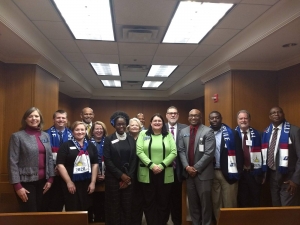
Good to visit with local elected officials from Chamblee, Norcross, Doraville & Tucker at Georgia Municipal Association Day at the Capitol.
